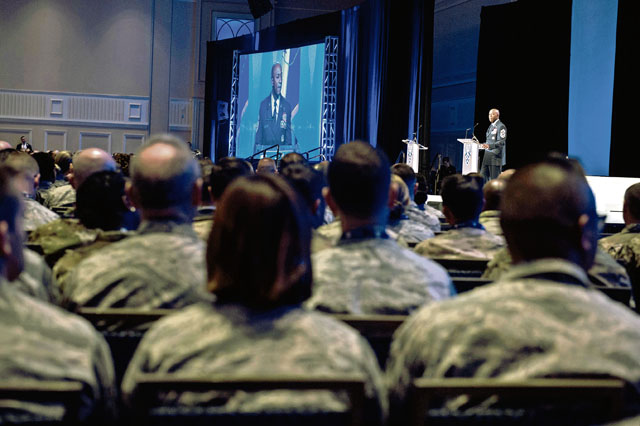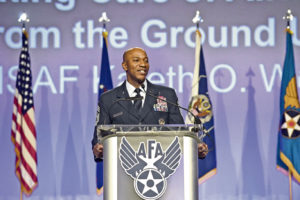
In order to win tomorrow’s war, defend the homeland and remain a safe and secure nuclear deterrent, Airmen must be well-trained, well-led, agile and resilient, according to the Air Force’s most senior enlisted leader.
Building upon Secretary of the Air Force Heather Wilson’s discussion of the “Air Force We Need” and Air Force Chief of Staff Gen. David L. Goldfein’s assessment of how to use the advantages of multi-domain operations, Wright said the “Airmen We Need” must be well trained, well led and agile in addition to resilient.
“If the foundation of readiness is training, then the core of what makes an Airman more lethal is resilience,” said Chief Master Sgt. of the Air Force Kaleth O. Wright during the Air Force Association’s Air, Space and Cyber Conference in National Harbor, Md., Sept. 19. “I used to think [resilience] was the ability to bounce back, but I now see it as the ability to move through the hardships, the pain, the fear and the suffering.”

The poem “Invictus” by William Ernest Henley has become a mantra of Wright’s, as it serves as a reminder that one controls their own fate. Though Air Force leaders have the “tremendous responsibility” of ensuring the right resources, programs and leaders are in place to build and maintain resilient Airmen and families, the CMSAF charged each Airman with investing in their own destiny.
Over the past 18 months, Wright traveled across the globe and met real-world examples of this level of resilience… describing them as fascinating, humbling and inspiring.
“Our heroes, didn’t ask for cancer, didn’t ask to be blown up, didn’t ask to be born with debilitating diseases,” Wright said. “They weren’t responsible for their situations, but they were all responsible for how they dealt with it. Responsibility offers power; it allows you to become pioneers not victims. You get to forge your own path — that’s more challenging. It’s more difficult, but much more rewarding.”
Wright said Airmen must start with themselves if they want to become more resilient, stronger when facing adversity and unconquerable.
“No one escapes pain, escapes fear, escapes suffering,” he said. “Yet from pain can come wisdom, from fear can come courage and from suffering can come strength — if we have the virtue of resilience.”


